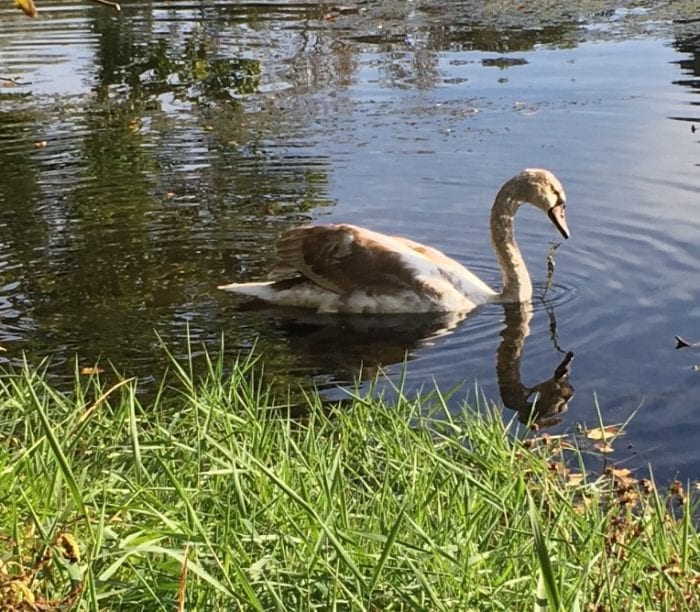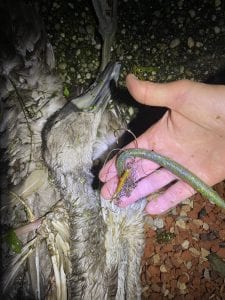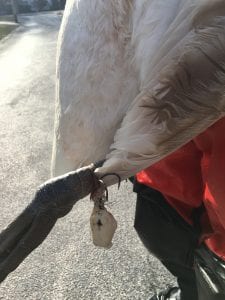Fishing Causes Bird Death at Frank Melville Park

At Frank Melville Memorial Park, remnants of fishing gear have created a nuisance that has led to wildlife injuries and even death, even though the activity isn’t allowed at the private park.

Recently, park personnel discovered a dead cygnet in the millpond. The young swan was pulled from the water, and it was entangled in a fishing line with a large lure hooked into its neck. Anita Jo Lago, the park’s wildlife coordinator, said most likely the cygnet, after becoming entangled in the fishing line, drowned.
“It was a rainy day so I think that’s what delayed people seeing it,” Lago said. “Finally, when the rain stopped, we had a park visitor who saw it and reported it. If it was a sunny day, we would have known earlier and maybe have been able to untangle it before it drowned.”
Lago called the death of the cygnet, who was just about to learn how to fly, horrific.
“It was so avoidable just with help and courtesy from fishers,” she said. “Please don’t fish, and when you do, have some responsibility.”
Lago visits the pond every day to check on the wildlife. The incident isn’t the first time that animals were injured after fishers left gear behind. Lago said there have been snapping turtles with lines around their necks and hooks up their noses. Many of the creatures also have ingested hooks and lure, and she said two years ago a heron’s leg was amputated from a line. Geese have been found wrapped in netting, and dogs regularly step on hooks during walks around the park. One time a cygnet’s chest was sliced by a fishing line to the point where the internal organs could be seen. She added that when ingested, fishing lines move up and down and sever an animal’s intestines.
“When bobbins are laying on top of the water, the cygnets go and they eat them,” she said. “They think they’re toys or food.”
The staff has conducted cleanups to rid the pond of debris and posted signs in the park and messages on social media forbidding fishing, but Lago said the fishers keep coming into the park to fish. She said the millpond is only 2 or 3 feet deep, which isn’t as deep as the average pond, so it means fishing lines just sit on top. Line also gets tangled in tree branches that she said are difficult to reach from land or even in a boat.
“I get very anxious when I see the wildlife swimming in that area, and they’re so fast,” she said. “They think that the lure is a leaf or piece of vegetation.”
At one time, fishing was allowed in FMMP. Kerri Glynn, director of education for the park, said in 2005 Phil Brady, at the time a junior in Ward Melville High School, asked her if the park could start an educational program to teach Boy Scouts how to fish responsibly, including keeping track of and cleaning up one’s gear.
“We had a fishing club run by a wonderful young man, and it definitely kept people on the straight and narrow for several years but then we started having these issues,” Glynn said.
She added that after Brady went to college, the club lasted a while longer but then ran its course. It was then that board members decided to prohibit fishing at the park, once again, due to lure and filament accumulating, and they would try to guide people to other spots where they could fish. She said it seems as if many fishers aren’t paying attention to what they leave behind.

“We were always aware it was problematic,” the park’s education director said. “We tried to deal with it in a responsible way, and in a way that allowed people to continue to fish as long as they were responsible fishermen. That didn’t happen. They just took advantage and didn’t pay attention to the rules or anything else, so that’s why we had to shut it down.”
John Turner, a local environmentalist and former director of Brookhaven Town’s Division of Environmental Protection, said he has seen similar situations on Long Island.
He said at many fishing locations such as Stony Brook, Port Jefferson and Mount Sinai harbors as well as West Meadow Beach there are filament receptacles. While fishing isn’t allowed at FMMP and there are therefore no containers, fishers can hold on to discarded fishing lines and then dispose of them the next time they go to one of the other locations. Turner said the filament is then collected and recycled into new fishing line.
He added that, besides a fisher disposing filament properly, there are ways to decrease the odds of having fishing line and bobbins getting caught in vegetation.
“It’s being aware of the environment around you and putting yourself in a place to fish that’s not likely to cause any entanglements or snares,” he said.
Turner said when people come across an animal in distress to try to move it to a quiet and sheltered place if possible and then call a wildlife rehabilitation center. He said it’s possible to help a small bird when a line is around its beak or limb by calming down the animal, holding the beak and cutting the line.
He added that it’s frustrating that many feel they don’t need to follow the rules of private parks such as FMMP when the foundation’s board is serving the community by making the grounds available to the public.
“These regulations and rules are put together thoughtfully and with recognizing that you’re trying to balance sometimes competing activities, competing uses, and you’re trying to strike a balance,” he said. “If the foundation says that fishing is not an activity that’s appropriate then the public needs to really respect that and not just decide to do what they want to do.”
The park’s board has asked that if people see anyone fishing in the park to call 631-689-7054.






